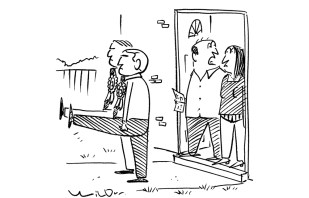My father was fond of telling anyone who would listen that Britain would never entertain fascism because we all had a sense of humour which enabled us to see the ridiculousness of its hastily fabricated myths and legends. By contrast, mainland Europeans had no sense of humour at all and would happily follow any strutting oaf in a spittle-bedecked uniform. So, while the Germans had Hitler, the Spanish Franco and the Italians Mussolini, the closest we came was Roderick Spode and his Black Shorts, a hilarious creature who P.G. Wodehouse modelled on the scarcely less risible Oswald Mosley. It is a comforting notion and yet, much as with his other cherished beliefs, to the effect that people from the Caribbean were ‘always cheerful’ and that the BBC’s Robert Dougall made all the news up when he was live on air, I did question its rectitude, even at quite a young age.
Never have we been so out of step with our continental allies
Just this week, however, I had cause to remember my dad’s explanations as almost the entirety of mainland Europe swung very sharply to the right, while we seem intent on ushering in the most left-wing government we have seen since about 1964, if not 1945. Never have we been so out of step with our continental allies. It is almost worth hoping that once the election is over the left really does take us back into the EU.
I would pay to see how Labour and the Libs try to find some sort of agreement with the likes of Jordan Bardella, Geert Wilders and Robert Fico: three politicians who believe that you have not solved the migrant crisis simply by whimpering endlessly, wringing your hands and opining that ‘these people are HUMAN BEANS’.
The triumph in Europe of what the BBC calls ‘far-right’ parties and which the rest of us would characterise very differently, has been a long time coming – and is still not quite there yet. The consequences of an ever more authoritarian and grasping European Union, wedded to the familiar post-rational left-liberal social platitudes, plus the increasing pressures – both economic and cultural – occasioned by inward migration from countries where people tend to hate us, were already evident at the turn of this century, with Pim Fortuyn in the Netherlands, the rise of Jean-Marie Le Pen and the limited success of groups such as Vlaams Blok in Belgium and the Alliance for the Future of Austria.
The BBC’s Europe correspondent Angus Roxburgh wrote a typically even-handed appraisal of these new parties in a book entitled Preachers of Hate and it is fair to say that the European Union’s approach to political difference was similarly measured and democratic. The EU vilified and persecuted every party, across the continent, which felt uneasy about the EU’s expansion of powers and its unlimited welcome afforded to immigrants as they poured across its borders. Not to mention all the other rubbish attendant upon the progressive programme.
In short, countries such as Austria were threatened with eviction if their people continued to vote the wrong way; or they were hounded and prosecuted if these new parties gained any semblance of power, as in Hungary and Poland, and attempted to see their manifestos through.
But the liberal centre’s disastrous stewardship somehow ensured that the rebellious feeling would not be extinguished, but would grow and grow as the decades marched past. The death of a singularly inept, undemocratic and authoritarian ‘progressive’ Europe has been too long in coming, but we are not so far from it now.
Except, of course, here – and what interests me is why we have stayed so immune. I suppose you might argue that Ukip represented our moment of rebellion and was uniquely successful in getting us out of the benighted EU. But the same cultural and economic neoliberal policies have nonetheless continued post-June 2016 and now the British public, alone in Europe, seems to yearn for an even larger dose of them.
The divide is even more stark because the growth of the supposed reactionaries across Europe has been fuelled largely by the votes of young people. Yet it is precisely our young people who are propelling Labour to victory on 4 July. What we call, a little lazily, ‘wokery’ is nowhere more at home anywhere in the world – beyond North America – than on British university campuses. Unlike the same generation on the mainland of Europe, our youth swallow every fantastically stupid shibboleth of post–rational identity politics. The question is why this should be so.

There is a case for saying that our first-past-the-post system, arguably the least truly democratic anywhere in Europe, has militated against us having our own populist uprising. It is still the case, remember – and may remain so – that Nigel Farage has never won himself a seat in the Commons. But with proportional representation in place, Ukip easily swept the board in the 2014 Euro elections, securing more than 26 per cent of the vote from an almost standing start. Our parliamentary voting system is, of course, constructed precisely to resist change and it has done its work to that end admirably. It will continue to do so until we introduce PR.
Perhaps it is also true, though, that we have a more overweening liberal elite than that which presides on the mainland. I doubt any country in Europe has a state broadcaster so intransigently monocultural and which imposes its own stupid views without cessation. Our universities also toe the line rather more vigorously than they do abroad, which may partly explain why our young people are so determinedly progressive about every-thing. But there must surely be a lot more to it than that, an explanation for our apparent aloofness to the populist cause which is more cogent than simply that we have a good sense of humour.








Comments